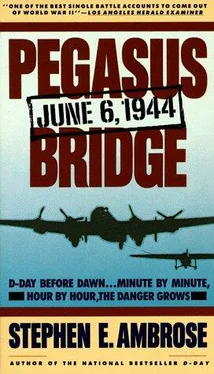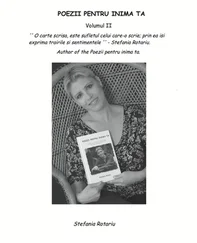Stephen Ambrose - Pegasus Bridge
Здесь есть возможность читать онлайн «Stephen Ambrose - Pegasus Bridge» весь текст электронной книги совершенно бесплатно (целиком полную версию без сокращений). В некоторых случаях можно слушать аудио, скачать через торрент в формате fb2 и присутствует краткое содержание. Жанр: История, на английском языке. Описание произведения, (предисловие) а так же отзывы посетителей доступны на портале библиотеки ЛибКат.
- Название:Pegasus Bridge
- Автор:
- Жанр:
- Год:неизвестен
- ISBN:нет данных
- Рейтинг книги:5 / 5. Голосов: 1
-
Избранное:Добавить в избранное
- Отзывы:
-
Ваша оценка:
- 100
- 1
- 2
- 3
- 4
- 5
Pegasus Bridge: краткое содержание, описание и аннотация
Предлагаем к чтению аннотацию, описание, краткое содержание или предисловие (зависит от того, что написал сам автор книги «Pegasus Bridge»). Если вы не нашли необходимую информацию о книге — напишите в комментариях, мы постараемся отыскать её.
Pegasus Bridge — читать онлайн бесплатно полную книгу (весь текст) целиком
Ниже представлен текст книги, разбитый по страницам. Система сохранения места последней прочитанной страницы, позволяет с удобством читать онлайн бесплатно книгу «Pegasus Bridge», без необходимости каждый раз заново искать на чём Вы остановились. Поставьте закладку, и сможете в любой момент перейти на страницу, на которой закончили чтение.
Интервал:
Закладка:
Parr and Bailey covered the retreat. When they pulled back behind a chateau, Parr gasped out to the Padre standing there with the wounded, 'Let's get going. They are right behind us.' The Padre replied that he was going to stay with the wounded, be taken prisoner with them, so that he could be with them in their POW camp. Bailey and Parr organised some of the men, found some improvised stretchers, and carried the wounded back to Herouvillette. 'It wasn't far'. Parr says, 'only three-quarters of a mile'.
When they got there, the rest of the men were lined up in the ditch all facing the direction from which the Germans would be attacking. 'And the sergeant major, almost with tears in his eyes, was striding up and down and saying in a great booming voice, "Well done, lads. Well done. Wait till the bastards come at us this time. We'll mow 'em down. I'm proud of you. Well done." ' It was a scene more reminiscent of World War I than World War II.
When the Germans did come, D Company mowed them down as if it was the Battle ofMons all over again. But that only highlighted the transformation that had taken place in D Company's role. On June 6 it had been at the cutting edge of tactical innovation and technological possibilities. On June 7 it was fighting with the same tactics ordinary infantry companies used throughout the First World War.
Howard set up headquarters in Herouvillette, and the company stayed there for four days. They were always under attack by mortar and artillery fire, sometimes having to fight off tanks and infantry. By the end of four days, they were down to less than fifty fighting men.
The company moved twice more, then settled down into defensive positions it was to hold for almost two months. 'The only thing we could do was to send out fighting patrols every night to bring back prisoners', Howard says. On one patrol he took with Wally Parr, they found themselves in the area where the Battle of Breville had just been fought. In the moonlight they could see the scattered corpses of men who had been killed by an artillery concentration. Howard and Parr found one group of six men, sitting in a circle in their half -completed slit-trench, playing cards. They were still sitting up, holding their cards, and they had no bullet or shrapnel wounds. But they were all dead, killed by concussion.
During this period, Howard says, 'the biggest problem I had was keeping up the morale of the troops because we had always got the impression that we would soon be withdrawn from Normandy to come back and refit in the UK for another airborne operation'. After all, the glider pilots had been withdrawn and were already in England.
Another morale problem came from the constant shelling. 'Chaps began to go bomb -happy', Howard says.
At first many of us tended to regard it as a form of cowardice and we were highly critical. I remember that I tended to take a very tough and almost unfeeling line about it. But after a time, when we began to see some of our best and most courageous comrades going under, we soon changed our minds. We could see that it was a real sickness. Men would hide away and go berserk during bombardments, and they became petrified during attacks. They could not be used for patrols, or even sentry duty, and the only answer was to hand them over to the Medical Officer, who, once he was satisfied it was a genuine case, had the man evacuated as a casualty. It was pathetic to see good men go down.
Howard himself almost went under. By D-Day plus four, he had gone for five days with almost no sleep, and his losses in Escoville and Herouvillette were heartrending. 'I felt terribly depressed and pessimistic', Howard admits, 'feeling quite sure that the Allied bridgehead was going to collapse on our vulnerable left flank. However, once the CO and the MO persuaded me what was wrong, with quiet threats of evacuation, I luckily shook myself out of it. It was an awful experience.'
Howard learned a lesson from the experience. He got regular, if short, periods of sleep for himself, and he saw to it that the platoon leaders arranged regular rest periods for everyone in turn, especially after attack or shell fire. Another manifestation of the pressure was some self-inflicted wounds, shots through the leg or foot 'usually said to have occurred when cleaning weapons. They were very difficult to prove.' Howard found that keeping up morale when casualties are heavy is always difficult and he did what he could. 'Good discipline and esprit de corps goes a long way towards overcoming it, but I found keeping the men well occupied was as good a cure as any. Active aggressive patrolling, sniping parties, marches behind the line and above all keep everyone in the picture. Glean all you can from HQ by way of information about how the battle is going and have regular meetings with the men to pass it on.'
Howard went to HQ not only to find out what was going on, but to do all those little things a good company commander does. He made certain there were plenty of cigarettes, for example, with an extra supply after a battle or a shelling. He also ensured the prompt arrival and distribution of the mail ('Essential for maintaining good morale'), sending runners back to HQ for the mail if he thought he could save a few minutes. Getting fresh bread was another morale-booster, though the first shipment did not arrive until about D plus 25. 'I was astounded over how much we longed for it.'
Cleaning weapons became almost an obsession. First thing in the morning, after the dawn stand to and breakfast, everything came out - rifles, machine-guns, Piats, mortars, grenades, ammunition - and everything was cleaned, oiled and inspected. Many of the men had a Schmeisser by this time.
During this period, Howard says, 'one thing I could never get used to were the smells of battle. Worst of these was dead and putrefying bodies. The men, friend and foe, were buried, but there was dead livestock everywhere just rotting away. In the middle of summer it was hell. At one chateau a stable full of wonderful racehorses was caught in a burning building. The appalling smell from that place spread over a very wide area, and it was sickening. We eventually dealt with it by loads of lime, but you can imagine the flies that pyre attracted.'
But the biggest morale problem of all was a nagging question in every man's mind: 'Why are we being wasted like this? Surely there must be other bridges between here and Berlin that will have to be captured intact.'
It is indeed a mystery why the War Office squandered D Company, a unique group in the British army. Huge sums had been spent on its training, and its combination of training, skills, and hand-picked officers was unsurpassed.
Despite all this, the War Office sacrificed D Company to the German guns. Sweeney was wounded, Friday was wounded, Hooper was wounded - by August none of D Company's original officers were left, save Howard himself. All the sergeants and the sergeant-major were gone. Thornton had a leg wound and had been evacuated; so had Parr.
On D plus 11, Howard was wounded again, receiving shrapnel in his back. His driver took him back to an aid post where a surgeon removed it, and when he finished, the doctor told Howard to lie there for a while. Mortar rounds started coming in, and everybody ran for cover. Howard looked around. He was alone in the farmhouse operating-room. He jumped off the table, put on his shirt and battle smock, and went outside. Finding his driver taking shelter under the jeep, he told him, 'Let's get back to the company. It's quieter there than it is here.'
Howard's return to the front lines was followed by some confusion as to his whereabouts. All the documentation at the aid post showed that he had been evacuated to England, and as a result his mail was diverted to hospital there. The daily letters he had been getting from Joy suddenly stopped coming. This was the period when Vis and V2s were raining down on England and he was tortured with thoughts other death and the loss of his children. That experience, Howard says, 'nearly sent me round the bend'.
Читать дальшеИнтервал:
Закладка:
Похожие книги на «Pegasus Bridge»
Представляем Вашему вниманию похожие книги на «Pegasus Bridge» списком для выбора. Мы отобрали схожую по названию и смыслу литературу в надежде предоставить читателям больше вариантов отыскать новые, интересные, ещё непрочитанные произведения.
Обсуждение, отзывы о книге «Pegasus Bridge» и просто собственные мнения читателей. Оставьте ваши комментарии, напишите, что Вы думаете о произведении, его смысле или главных героях. Укажите что конкретно понравилось, а что нет, и почему Вы так считаете.




![Stephen Ambrose - Citizen Soldiers [Condensed]](/books/346737/stephen-ambrose-citizen-soldiers-condensed-thumb.webp)




